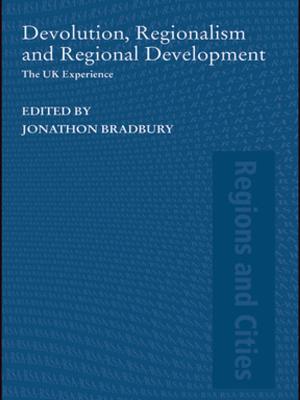The UK Regional-National Economic Problem
Geography, globalisation and governance
Business & Finance, Economics, Development & Growth| Author: | Philip McCann | ISBN: | 9781317237174 |
| Publisher: | Taylor and Francis | Publication: | March 10, 2016 |
| Imprint: | Routledge | Language: | English |
| Author: | Philip McCann |
| ISBN: | 9781317237174 |
| Publisher: | Taylor and Francis |
| Publication: | March 10, 2016 |
| Imprint: | Routledge |
| Language: | English |
In recent years, the United Kingdom has become a more and more divided society with inequality between the regions as marked as it has ever been. In a landmark analysis of the current state of Britain’s regional development, Philip McCann utilises current statistics, examines historical trends and makes pertinent international comparisons to assess the state of the nation.
The UK Regional–National Economic Problembrings attention to the highly centralised, top down governance structure that the UK deploys, and demonstrates that it is less than ideally placed to rectify these inequalities. The ‘North-South’ divide in the UK has never been greater and the rising inequalities are evident in almost all aspects of the economy including productivity, incomes, employment status and wealth. Whilst the traditional economic dominance of London and its hinterland has continued along with relative resilience in the South West of England and Scotland, in contrast the Midlands, the North of England, Northern Ireland and Wales lag behind by most measures of prosperity. This inequality is greatly limiting national economic performance and the fact that Britain has a below average standard of living by European and OECD terms has been ignored. The UK’s economic and governance inequality is unlikely to be fundamentally rebalanced by the current governance and connectivity trends, although this definitive study suggests that some areas of improvement are possible if they are well implemented.
This pivotal analysis is essential reading for postgraduate students in economics and urban studies as well as researchers and policy makers in local and central government.
In recent years, the United Kingdom has become a more and more divided society with inequality between the regions as marked as it has ever been. In a landmark analysis of the current state of Britain’s regional development, Philip McCann utilises current statistics, examines historical trends and makes pertinent international comparisons to assess the state of the nation.
The UK Regional–National Economic Problembrings attention to the highly centralised, top down governance structure that the UK deploys, and demonstrates that it is less than ideally placed to rectify these inequalities. The ‘North-South’ divide in the UK has never been greater and the rising inequalities are evident in almost all aspects of the economy including productivity, incomes, employment status and wealth. Whilst the traditional economic dominance of London and its hinterland has continued along with relative resilience in the South West of England and Scotland, in contrast the Midlands, the North of England, Northern Ireland and Wales lag behind by most measures of prosperity. This inequality is greatly limiting national economic performance and the fact that Britain has a below average standard of living by European and OECD terms has been ignored. The UK’s economic and governance inequality is unlikely to be fundamentally rebalanced by the current governance and connectivity trends, although this definitive study suggests that some areas of improvement are possible if they are well implemented.
This pivotal analysis is essential reading for postgraduate students in economics and urban studies as well as researchers and policy makers in local and central government.















